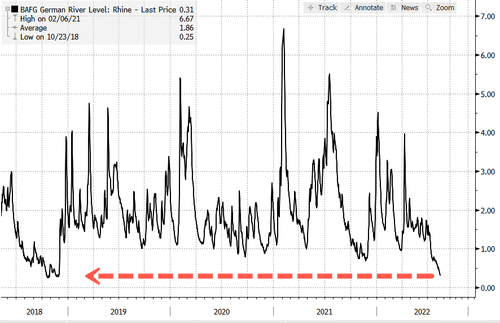Shocking Footage Reveals Rhine’s Dried Up Riverbeds As Water Levels Continue To Fall
Water levels on Germany’s Rhine River continued to decline Monday, hitting a new threshold as an extended period of dry weather exacerbated Europe’s energy-supply crunch. Falling water levels have also revealed shocking photos of partially dried riverbeds that would make the Rhine impassible at certain points, according to Euronews.
“The current water levels on the Middle and Lower Rhine are currently at an exceptionally low level for this time of year,” the Rhine Waterways and Shipping Authority (WSA), said in a statement. “They are the result of the lack of precipitation in recent weeks and months.”
Levels at Kaub, a narrow and shallow point of the river west of Frankfurt, Germany, fell to 30 centimeters (11.8 inches) on Monday and could hold those levels through Thursday.
The Rhine is one of Europe’s most important inland waterways for the transport of fuel and other industrial goods. Many shippers find it uneconomical to operate barges past Kaub when water levels drop below 40 centimeters (15.7 inches).
As of Monday, it wasn’t clear how the drop to 30 centimeters at Kaub would affect river traffic. We noted last week at least one German shipper said barge operations would be halted — and this would impact the flow of industrial goods, especially coal used for power generation.
Last week, we pointed out the top companies exposed to falling water levels that would disrupt barge traffic, implying they would have to resort to trucks or rail to transport goods.
Not all barge traffic has been halted, and some shippers have dramatically reduced cargo sizes on vessels to improve draft to navigate shallow parts of the river — this has caused barge transport prices to skyrocket.
It’s distressing enough to see data on the Rhine’s water levels dropping, but actually seeing footage is reveals just how much impact it’s going to have on transport networks for Germany to move around commodities and goods.
Kaub’s reading is just 6 centimeters (2.4 inches) from 2018’s record low of 25 centimeters (9.9 inches), which then caused the waterway to close and unleashed an economic downturn in the EU’s largest economy. The same is likely to happen and possibly be much worse as a persisting energy crisis amplifies the downturn.
Tyler Durden
Mon, 08/15/2022 – 12:40

